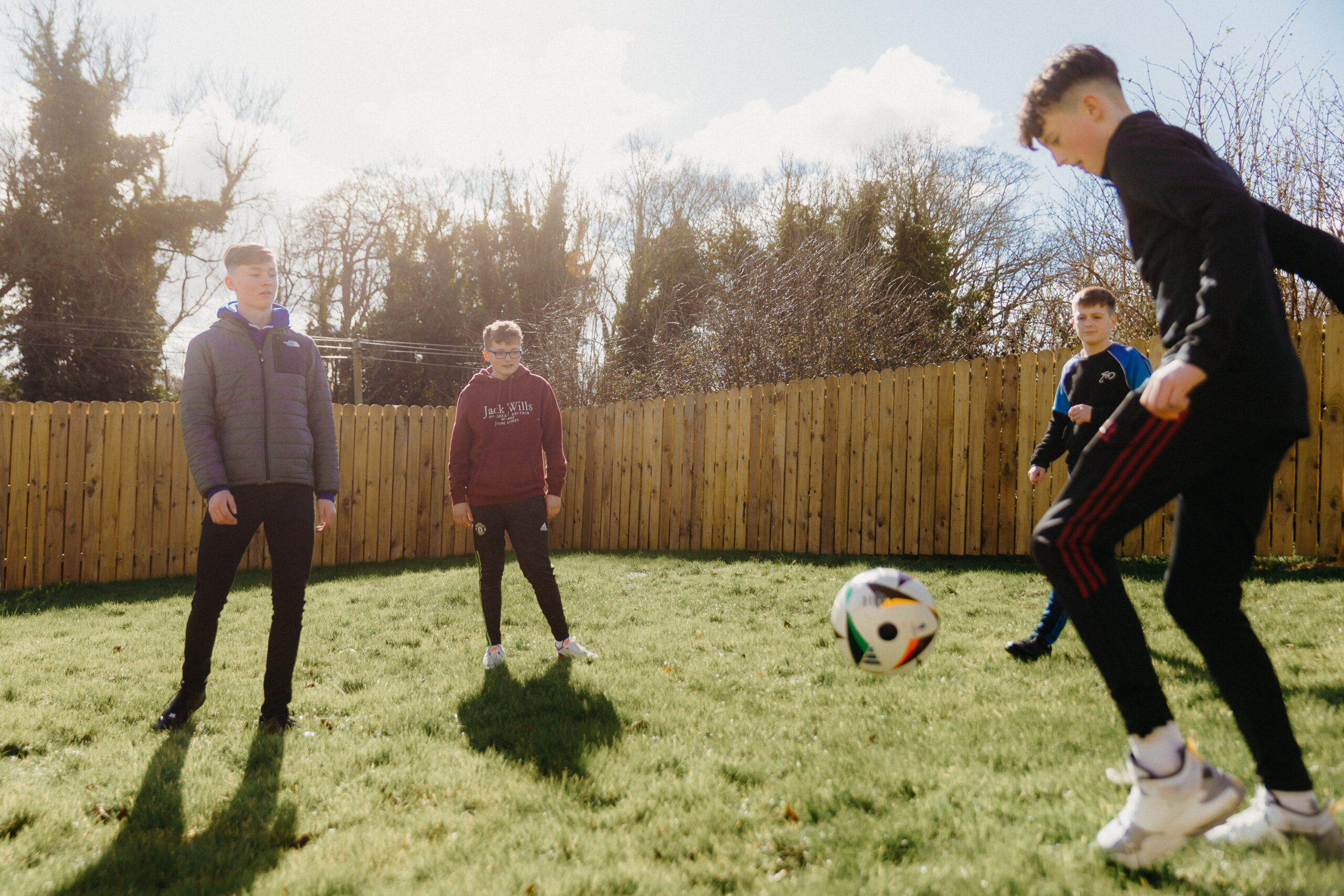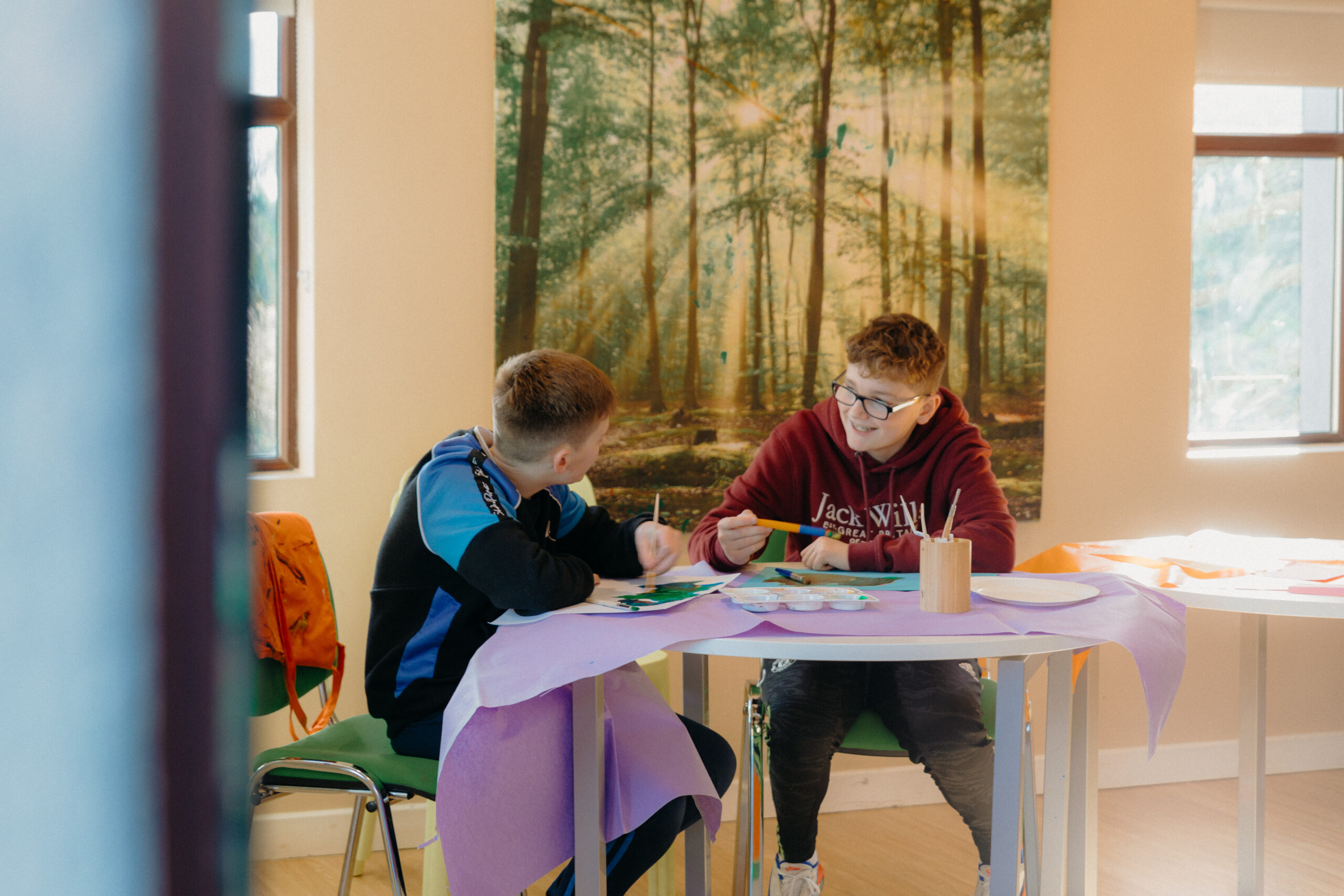The Role of Play in Child Development and Recovery from Trauma

At Ashdale Care, we believe in the transformative power of play. It is not just a simple pastime for children but a crucial aspect of their development and healing. As children learn to engage in play, they are also learning about themselves and the world around them. It helps them to process emotions and to build essential cognitive and social skills. It teaches them new ways to interact with the world and others. In residential child care, where many children have experienced trauma and adversity, play takes on an even more vital role in their development and growth.
The Therapeutic Power of Play
“Play is the most natural and effective way for children to learn about themselves, other people and the world they live in.” – Dr. Ronan Gibney, Director of Psychology & Therapeutic Services at Ashdale Care
Play is a truly integral part of childhood. It is active, enjoyable, communicative and meaningful. It can be solitary or social, symbolic or literal, and helps children explore, learn, and express emotions. It’s a key way children learn about themselves, others and the world. Unfortunately, there are some children who come to Ashdale Care who do not know how to play. They may have only had limited opportunities to engage in play in their young lives. We must be the guardians of this vital part of a child’s learning, and ensure that the benefits of it are made available to every child.
The Benefits of Play in Child Development
Emotional Expression and Regulation
Children often find it difficult to express their feelings, particularly if they have had difficult or traumatic experiences. Play can allow a space for children to feel safe and express and explore their emotions in a way that feels manageable to them. This can be through pretend, imaginary scenarios, physical activities or arts and crafts. It can be a way of learning how to explore their emotions and ways to regulate them.
Cognitive Development
Play is vital to cognitive growth and development. Through puzzles, problem solving games etc., children can improve their thinking skills, their memory and their understanding of the effects their actions can have. This type of learning is truly crucial for building the foundations that supports academic success.
Social Skills
By playing with other children and caregivers, it gives the children in our care the opportunity to develop and refine their social skills. They get the chance to learn how to cooperate, take turns, understand and navigate social dynamics and situations, and learn right from wrong. These are all essential skills for developing a sense of self-in-the-world and for building and maintaining relationships. This is particularly vital for children in care who may struggle with social interactions due to past traumatic experiences.
Physical Development
Physical play is a critical component of developing motor skills and coordination whilst staying healthy. Things like running, playing football, hide and seek, dancing or playing music helps to strengthen their bodies and enable children to regulate themselves.
Play as Support to Therapeutic Interventions for Children in Residential Care
In a residential care setting for children, play can serve as a vital tool for both emotional healing and cognitive development:
- Therapeutic Play: Since play is therapeutic, it can help children in residential care express emotions and process trauma in a safe environment. Activities like role-playing or symbolic play can help children to explore their feelings indirectly and safely.
- Structured and Free Play: Balancing structured activities like games with rules and free play can provide a sense of normalcy and routine while allowing children to make choices and exert control, which has often been lacking in their lives.
- Safe Play Environment: Creating safe, well-resourced play areas both indoors and outdoors can provide children with a space where they feel secure to explore and interact with others.
- Role of Caregivers: In residential care, caregivers can observe and participate in play when necessary, supporting the children’s social interactions and helping them navigate challenges during play.
- Social Skills and Integration: Play encourages cooperation and social interaction, which can be particularly beneficial for children in residential care who may struggle with forming relationships. Activities like cooperative games or team-building exercises can help develop these skills.
- Cultural and Individual Needs: Recognising and incorporating the cultural and individual needs of children into play activities can help them feel valued and understood, fostering a sense of identity and belonging.
Integrating play into residential care provides a holistic approach to supporting children’s emotional and developmental needs, fostering resilience and promoting recovery in a supportive and engaging environment. At Ashdale Care, we work to integrate play into our broader therapeutic framework. We actively encourage all members of our team to create and facilitate environments where elements of play are integrated into daily routines.
Creating Safe Spaces for Play
We make sure that our residential homes are conducive to play and have indoor and outdoor spaces that are safe and stimulating. These homes allow children to engage in play freely, whether they are alone, with peers or under the supervision of caregivers.
Supporting Emotional and Social Growth Through Play
Our team support the child’s broader emotional and social development through play. The caregivers’ observations of the child’s play can give invaluable insights into emotional states, self regulation and awareness, and can inform ongoing therapeutic work.
Play in Practice
Play is woven into our day-to-day interactions with the children in our care:
Structured Play Activities: We organise group games, sports and creative projects to promote teamwork, cooperation and collaboration. We design these activities to be both enjoyable and educational, so that we are engaging the children, creating social connections and boosting their emotional well-being.
Unstructured Play: We incorporate the freedom for children to explore their interests and imagination in everyday life at Ashdale Care. This is entirely up to the child as to what medium they would like, be it outdoor activities, arts and crafts or just playing with toys. This gives the children and young people lots of time to relax and just be themselves.
Therapeutic Play Interactions: Caregivers at Ashdale engage with children in play as a way to build trust and relationships. These interactions are not just about having fun, but also about supporting their natural development in a way that feels natural and unforced. These interactions are attuned to the individual needs of each child.
At Ashdale Care we understand that play is not a luxury but a necessity for healthy child development and healing. There are some children in our care who have to learn how to play, because they have not had much experience of playing in a safe, supportive environment. Our dedicated social care team, along with our team of therapists, harness the power of play to support the cognitive, social and emotional growth of the children who need specialised therapeutic care due to their complex behavioural needs. Through play, we are able to help these children reclaim their joy, sense of creativity and resilience. We can help them as they learn how to cope, relate to, and interact with the world around them.
